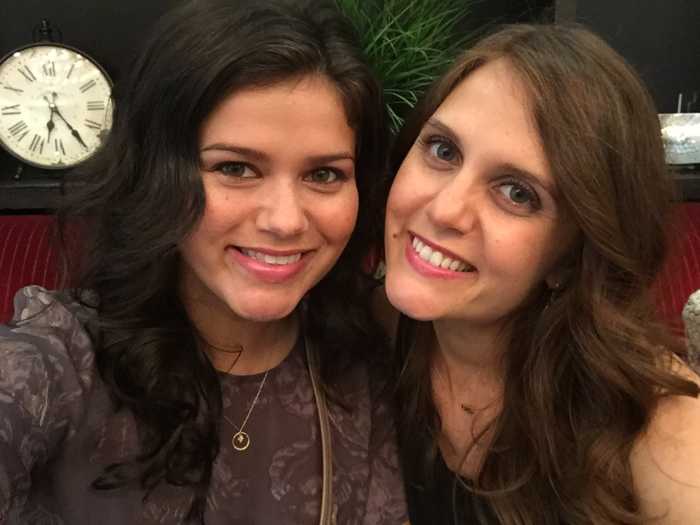Bedford Stuyvesant celebrated Juneteenth with a street co-naming ceremony on the corner of Greene and Marcy avenues for Max Roach, one of the most influential jazz drummers and composers of all time.
Friends and elected officials joined the Roach family for the unveiling of the “Max Roach Way,” which honors not only Roach’s musical legacy but also his role as a Civil Rights activist. The festivities were part of several nationwide events commemorating the centennial year of Max Roach, whose career spanned seven decades.
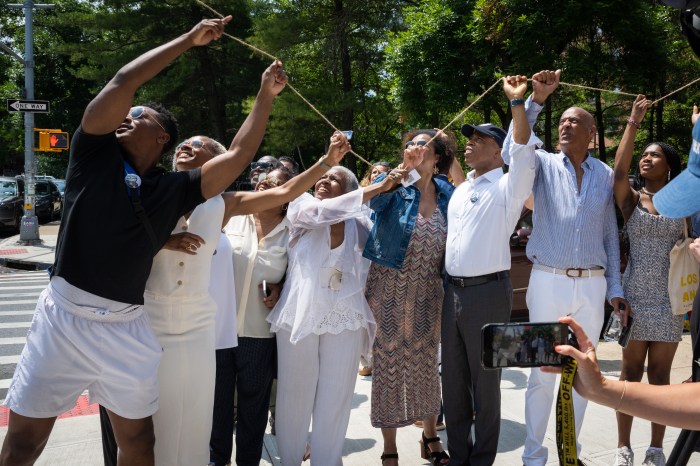
Roach was born in the South, and his family moved to Bedford-Stuyvesant when he was four. After graduating from the Boys High School in Brooklyn, Roach became the house drummer at Monroe’s Uptown House, where he played alongside bebop greats like Charlie Parker and Dizzy Gillespie. Roach recorded with Miles Davis and released his first solo work in 1953. The Grammy Hall of Famer, whose career spanned seven decades, was the first jazz musician to be honored with a MacArthur fellowship, the “Genius Grant.” Roach recorded his final album in 2002 and passed away on Aug. 16, 2007, at 83.
Council Member Chi Ossé, the master of ceremonies, proclaimed that while he was always proud to walk down Greene Avenue, he’d be even prouder now looking up at the street sign, knowing that he was walking in the footsteps of a giant.
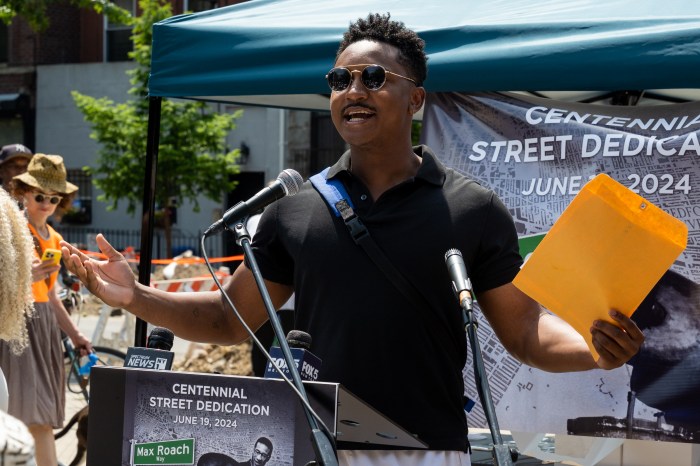
“In a career that spans many decades and touched countless lives, Max Roach set himself apart as one of Brooklyn’s greats,” Ossé said. “Our community, our culture, our city, and our music all wear his mark and carry his legacy.”
Ossé described Roach as “unequivocally pro-black.”
“We are dedicating the street to an artist who mastered his genre and advanced it, who dove into others and advanced them too, who composed ballads of freedom and triumphs of love, and who never forgot his roots and always came back home again,” Ossé said.
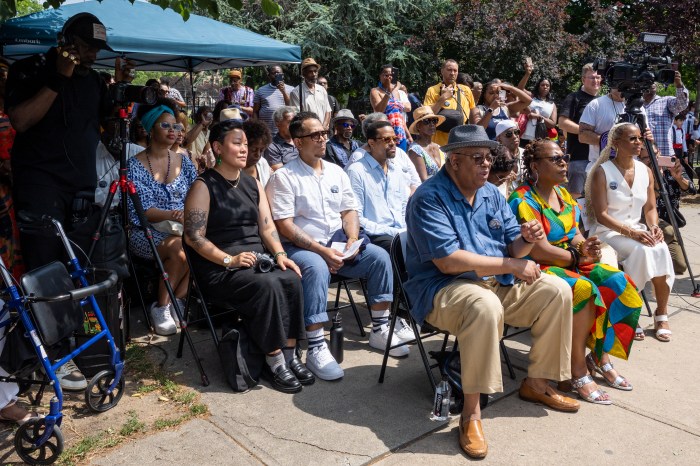
Maxine Roach, who played alongside her dad in the Uptown String Quartet, described her dad as an “exquisite” musician and shared that Roach was well-versed in all genres of music.
“I’m just so blessed to be able to have played with him,” Maxine Roach said. “I know he’s looking down right now. And he’s very proud that his family’s here. He’s enjoying this as well.”
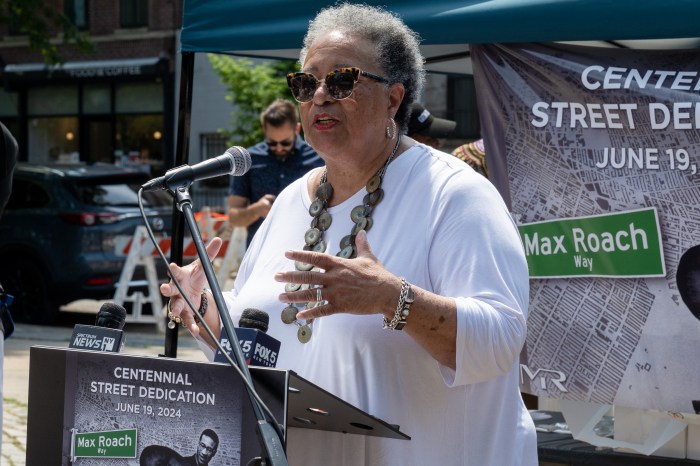
Assembly Member Stefani L. Zinerman greeted the crowd with “Happy Freedom Day.” Zinerman thanked the Roach family for keeping their father’s legacy alive.
“So many other artists, their talents, and their contributions have to be unearthed because no one told the story moving forward,” Zinerman said. “So thank you for doing that. Thank you for allowing us to celebrate him today.”
Drummer Nasheet Waits was one of Roach’s proteges, and shared that Roach taught him to find his identity.
“[Roach] would say, ‘Well, if you want to do this.’ And then, he would give me a demonstration of a drummer from this neighborhood that I had never heard of. And he said, ‘But that’s not what you want to do. What you want to do is be yourself,'” Waits said.
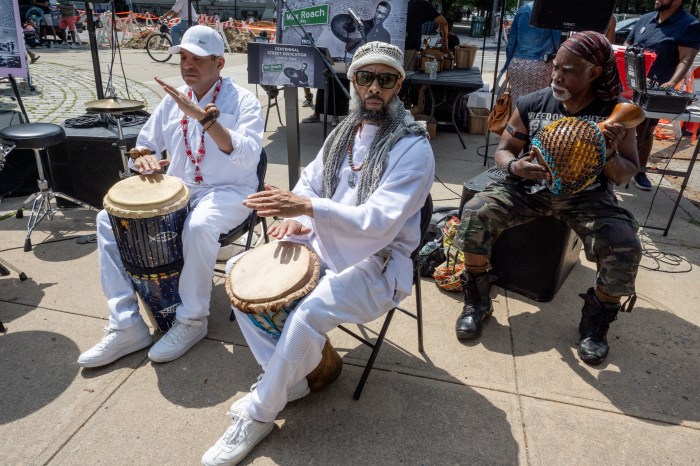
Jazz drummer and percussionist Warren Smith was a founding member of the Max Roach percussion ensemble M’Boom. Smith recalled that when on tour, Roach would ensure that the hotel accommodations for his band members were up to standard.
“There were six or seven of us, and we would check into a hotel, and before Max unpacked his bag, he would go around to each of our rooms and make sure that the accommodations met his satisfaction,” Smith shared. “What impressed me was that he was much more interested in the men that he was responsible for and how we were taking care of than he was in himself. His attitude towards humanity probably taught me more than even listening to him play music.”
Emmy-award-winning journalist Janus Adams said it was fitting that the street co-naming ceremony for Roach was held on Juneteenth.
“When we talk about Max, we are talking about a man [who] not only was conscious of the shoulders on which he stood but of the lives he carried on his own shoulders, everywhere he went,” Janus said. “What we have to also understand is that what Juneteenth represents is the 100 million lives seized and stolen, and forced into being strained for enslavement in the Americas for the slavocracy of America.”
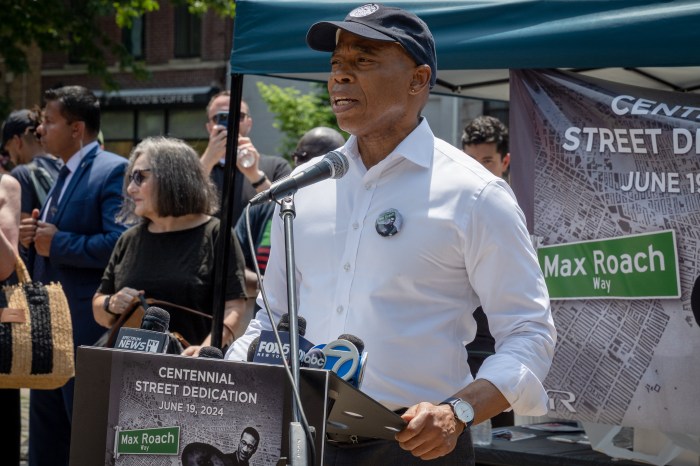
Mayor Eric Adams called Roach a “physician” because drums had the ability to heal.
“With all of the hate that we feel, it disconnects us, and drums have the ability to reconnect us,” Adams said. “And each time he played, each time we heard the beat, it allows us an opportunity of that reconnection that we need.”
Adams hoped that the street sign would inspire generations to come.
“Hopefully, every time a child walks down the block, they will look up, and they will see the name Max Roach and what it means [and] it will become inspiring to others as we reconnect ourselves from the pervasive hate that we see all the time,” Adams said.





